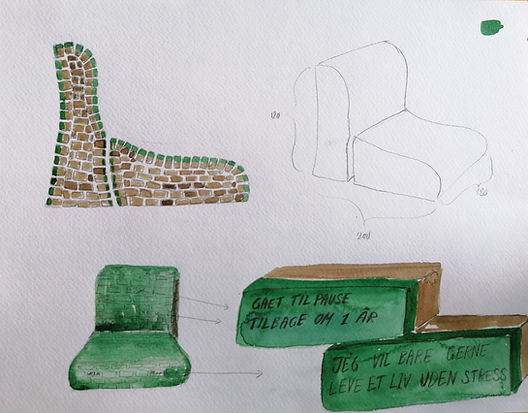8. DECENT WORK & ECONOMIC GROWTH
Hannah Toticki Anbert
Working title: Pause
INTRODUCTION
What is a decent job? What does work mean for our quality of life? Where does economic growth mean for us as humans and for the planet? These were some of the questions I started researching when I started my research for the sculpture.
The global labor market is an elusively large and motley size and the problems are so many and so diverse that it would be impossible to say anything meaningful about, in a single sculpture.
ARTISTIC STUDY
I have instead chosen to attack the problem from the perspective where both I and many of the sculpture park's audience members stand: Our small part of the globe.
In Denmark, work and career are a central part of our lives, in fact we spend the best hours of the day, a lot of time and creative energy at our work. Our working life means a lot to our quality of life, our sense of meaning with life, our self-understanding. Nevertheless, we see (according to the stress association) that 250,000 –300,000 Danes suffer from severe stressor that 500,000 Danes feel burnt out at work due to stress. The World Health Organization WHO has assessed that mental illness, especially stress and depression, is the biggest health challenge on a global scale by 2020. We are pushing ourselves to work more and more, not necessarily to make more money, but why then?
"Busyness is our common, recognized escape, our drug," says Poul Joachim Stender, in an article in the online newspaper Zetland, where he also argues that anyone over the age of 55 should take a "fumbling year." 55, I can well recognize that everyday life can take the form of a hectic work life that does not provide space for breaks and even less to look up and think about whether we use our time properly.
"Being busy" has become a constant condition for many of us who are at work, at the same time those who are outside the labor market also experience both stress and pressure, because it is precisely the work that gives access to be seen as an equal citizen. In parallel with this human, we see that the planet's resources are being squeezed and consumed faster than they can regenerate. I will therefore be critical of the part of the world goal called "economic growth".
I believe (like Piketty and many other leading economists today) that it is possible to create an economy that puts human growth, meaningful lives, respect for nature and our planet at the top of the agenda. Economic growth is not a law of nature. So how do we get a healthier working life? Breaks are part of the answer. Remembering the 5 minutes in the middle of the day where nothing needs to happen. To take a "spring year". That we together begin to attach value to the break -the unproductive.

Photo: Hannah Anbert sketch
Hannah Toticki Anbert graduated from the Royal Danish Academy of Fine Arts in 2016. She works with sculptures, performance art and installation. Anbert is interested in dry topics such as economics, debt and working life, she deals with these issues with equal parts humour and seriousness. She draws on the language of fashion, theatre and pop music, creating absurd and theatrical scenarios.


